Quantum Computing since Democritus
Written by noted quantum computing theorist Scott Aaronson, this book takes readers on a tour through some of the deepest ideas of math, computer science, and physics.
Full of insights, arguments, and philosophical perspectives, the book covers an amazing array of topics. Beginning in antiquity with Democritus, it progresses through logic and set theory, computability and complexity theory, quantum computing, cryptography, the information content of quantum states, and the interpretation of quantum mechanics. There are also extended discussions about time travel, Newcomb's Paradox, the Anthropic Principle, and the views of Roger Penrose. Aaronson's informal style makes this fascinating book accessible to readers with scientific backgrounds, as well as students and researchers working in physics, computer science, mathematics, and philosophy.
Scott Aaronson is an Associate Professor of Electrical Engineering and Computer Science at the Massachusetts Institute of Technology. Considered one of the top quantum complexity theorists in the world, he is well known both for his research in quantum computing and computational complexity theory, and for his widely read blog Shtetl-Optimized . Professor Aaronson also created Complexity Zoo, an online encyclopedia of computational complexity theory, and has written popular articles for Scientific American and The New York Times . His research and popular writing have earned him numerous awards, including the United States Presidential Early Career Award for Scientists and Engineers and the Alan T. Waterman Award.
CAMBRIDGE UNIVERSITY PRESS
Cambridge, New York, Melbourne, Madrid, Cape Town, Singapore, So Paulo, Delhi, Mexico City
Cambridge University Press
The Edinburgh Building, Cambridge CB2 8RU, UK
Published in the United States of America by Cambridge University Press, New York
www.cambridge.org
Information on this title: www.cambridge.org/9780521199568
S. Aaronson 2013
This publication is in copyright. Subject to statutory exception and to the provisions of relevant collective licensing agreements, no reproduction of any part may take place without the written permission of Cambridge University Press.
First published 2013
Printed and bound in the United Kingdom by the MPG Books Group
A catalog record for this publication is available from the British Library
Library of Congress Cataloging in Publication data
Aaronson, Scott.
Quantum computing since Democritus / Scott Aaronson.
pages cm
Includes bibliographical references and index.
ISBN 978-0-521-19956-8 (pbk.)
1. Quantum theory Mathematics. 2. Quantum computers. I. Title.
QC174.17.M35A27 2013
621.39

1 dc23 2012036798
ISBN 978-0-521-19956-8 Paperback
Cambridge University Press has no responsibility for the persistence or accuracy of URLs for external or third-party internet websites referred to in this publication, and does not guarantee that any content on such websites is, or will remain, accurate or appropriate.
Preface
A Critical Review of Scott Aaronson's Quantum Computing since Democritus by Scott Aaronson
Quantum Computing since Democritus is a candidate for the weirdest book ever to be published by Cambridge University Press. The strangeness starts with the title, which conspicuously fails to explain what this book is about . Is this another textbook on quantum computing the fashionable field at the intersection of physics, math, and computer science that's been promising the world a new kind of computer for two decades, but has yet to build an actual device that can do anything more impressive than factor 21 into 3 7 (with high probability)? If so, then what does this book add to the dozens of others that have already mapped out the fundamentals of quantum computing theory? Is the book, instead, a quixotic attempt to connect quantum computing to ancient history? But what does Democritus, the Greek atomist philosopher, really have to do with the book's content, at least half of which would have been new to scientists of the 1970s, let alone of 300 BC?
Having now read the book, I confess that Ive had my mind blown, my worldview reshaped, by the author's truly brilliant, original perspectives on everything from quantum computing (as promised in the title) to Gdel's and Turing's theorems to the P versus NP question to the interpretation of quantum mechanics to artificial intelligence to Newcomb's Paradox to the black-hole information loss problem. So, if anyone were perusing this book at a bookstore, or with Amazon's Look Inside feature, I would certainly tell that person to buy a copy immediately. Id also add that the author is extremely handsome.
Yet it's hard to avoid the suspicion that Quantum Computing since Democritus is basically a brain dump: a collection of thoughts about theoretical computer science, physics, math, and philosophy that were on the author's mind around the fall of 2006, when he gave a series of lectures at the University of Waterloo that eventually turned into this book. The material is tied together by the author's nerdy humor, his Socratic approach to every question, and his obsession with the theory of computation and how it relates to the physical world. But if there's some overarching thesis that Im supposed to take away, I can't for the life of me articulate what it is.
More pointedly, one wonders who the audience for this book is supposed to be. On the one hand, it has way too much depth for a popular book. Like Roger Penrose's The Road to Reality whose preface promises an accessible adventure even for readers who struggled with fractions in elementary school, but whose first few chapters then delve into holomorphic functions and fiber bundles Quantum Computing since Democritus is not for math-phobes. A curious layperson could certainly learn a lot from this book, but he or she would have to be willing to skip over some dense passages, possibly to return to them later. So if you're someone who can stomach science writing only after it's been carefully cleansed of the science, look elsewhere.
On the other hand, the book is also too wide-ranging, breezy, and idiosyncratic to be used much as a textbook or reference work. Sure, it has theorems, proofs, and exercises, and it covers the basics of an astonishing number of fields: logic, set theory, computability, complexity, cryptography, quantum information, and computational learning theory, among others. It seems likely that students in any of those fields, from the undergraduate level on up, could gain valuable insights from this book, or could use it as an entertaining self-study or refresher course. Besides these basics, the book also has significant material on quantum complexity theory for example, on the power of quantum proofs and advice that (to this reviewer's knowledge) hasn't appeared anywhere else in book form. But still, the book flits from topic to topic too hastily to be a definitive text on anything.
So, is the book aimed at non-scientists who won't actually make it past the first chapter, but want something to put on their coffee table to impress party guests? The only other possibility I can think of is that there's an underserved audience for science books that are neither popular nor professional: books that describe a piece of the intellectual landscape from one researcher's heavily biased vantage point, using the same sort of language you might hear in a hallway conversation with a colleague from a different field. Maybe, besides those colleagues, this hypothetical underserved audience would include precocious high-school students, or programmers and engineers who enjoyed their theoretical courses back in college and want to find out what's new. Maybe this is the same audience that frequents these science blogs Ive heard about: online venues where anyone in the world can apparently watch real scientists, people at the forefront of human knowledge, engage in petty spats, name-calling, and every other juvenile behavior, and can even egg the scientists on to embarrass themselves further. (The book's author, it should be noted, writes a particularly crass and infamous such blog.) If such an audience actually exists, then perhaps the author knew exactly what he was doing in aiming at it. My sense, though, is that he was having too much fun to be guided by any such conscious plan.

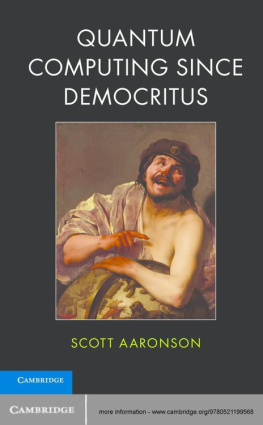



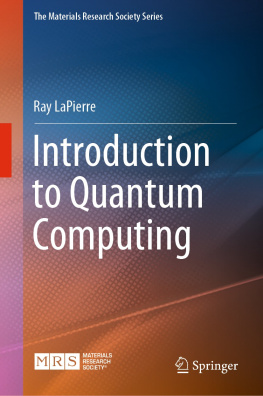
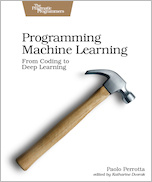
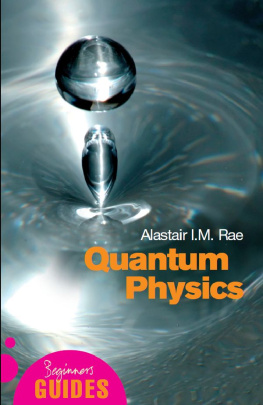
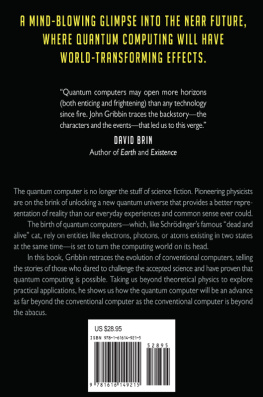

 1 dc23 2012036798
1 dc23 2012036798